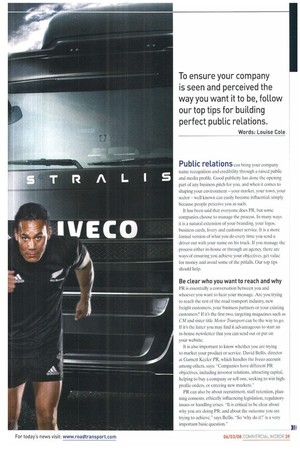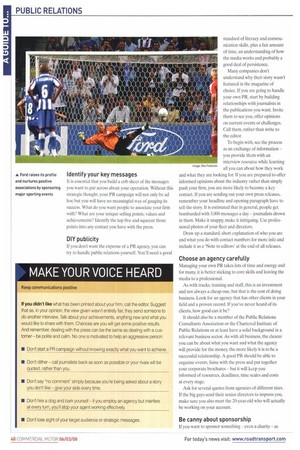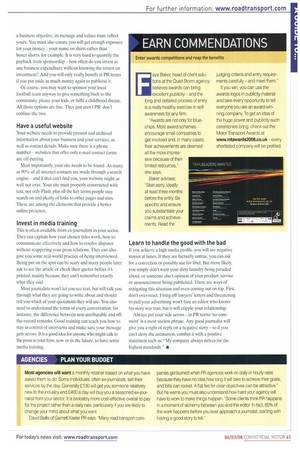To ensure your company is seen and perceived the way
Page 39

Page 40

Page 41

If you've noticed an error in this article please click here to report it so we can fix it.
you want it to be, follow our top tips for building perfect public relations.
Words: Louise Cole Public relations.. bring your company name recognition and credibility through a raised public and media profile. Good publicity has done the opening part of any business pitch for you, and when it comes to shaping your environment — your market, your town, your sector — well known can easily become influential, simply because people perceive you as such.
It has been said that everyone does PR, but some companies choose to manage the process. In many ways it is a natural extension of your branding, your logos, business cards, livery and customer service. It is a more formal version of what you do every time you send a driver out with your name on his truck. If you manage the process either in-house or through an agency, there are ways of ensuring you achieve your objectives. get value for money and avoid some of the pitfalls. Our top tips should help.
Be clear who you want to reach and why PR is essentially a conversation between you and whoever you want to hear your message. Are you trying to reach the rest of the road transport industry, new freight customers, your business partners or your existing customers? If it's the first two, targeting magazines such as CM and sister title Motor Transport can be the way to go. If it's the latter you may find it advantageous to start an in-house newsletter that you can send out or put on your website.
It is also important to know whether you are trying to market your product or service. David Bellis, director at Garnett Keeler PR, which handles the lveco account among others, says: "Companies have different PR objectives, including investor relations, attracting capital, helping to buy a company or sell one, seeking to win highprofile orders, or entering new markets."
PR can also be about recruitment, staff retention, planning consents, ethically influencing legislation, regulatory issues or handling crises. "It is critical to be clear about why you are doing PR, and about the outcome you are trying to achieve," says Bellis. "So 'why do it?' is a very important basic question."
Identify your key messages
It is essential that you build a crib sheet of the messages you want to put across about your operation. Without this strategic thought, your PR campaign will not only be ad hoc but you will have no meaningful way of gauging its success. What do you want people to associate your firm with? What are your unique selling points, values and achievements? Identify the top five and squeeze those points into any contact you have with the press.
DIY publicity
If you don't want the expense of a PR agency. you can try to handle public relations yourself. You'll need a good standard of literacy and communication skills, plus a fair amount of time, an understanding of how the media works and probably a good deal of persistence.
Many companies don't understand why their story wasn't featured in the magazine of choice. If you are going to handle your own PR, start by building relationships with journalists in the publications you want. Invite them to see you, offer opinions on current events or challenges. Call them, rather than write to the editor.
To begin with, see the process as an exchange of information — you provide them with an interview resource while learning
Image. Rex Features all you can about how they work
and what they are looking for. If you are prepared to offer informed opinions about the industry rather than simply push your firm, you are more likely to become a key contact. If you are sending out your own press releases, remember your headline and opening paragraph have to sell the story. It is estimated that in general, people get bombarded with 3,000 messages a day — journalists drown in them. Make it snappy, make it intriguing. Use professional photos of your fleet and directors.
Draw up a standard, short explanation of who you are and what you do with contact numbers for more info and include it as a 'Note to editors' at the end of all releases.
Choose an agency carefully
Managing your own PR takes lots of time and energy and for many, it is better sticking to core skills and leaving the media to a professional.
As with trucks, training and staff, this is an investment and not always a cheap one, but that is the cost of doing business. Look for an agency that has other clients in your field and a proven record. If you've never heard of its clients, how good can it be?
It should also be a member of the Public Relations Consultants Association or the Chartered Institute of Public Relations or at least have a solid background in a relevant business sector. As with all business, the clearer you can be about what you want and what the agency will provide for the money, the more likely it is to be a successful relationship. A good PR should be able to organise events, liaise with the press and put together your corporate brochures — but it will keep you informed of resources, deadlines, time scales and costs at every stage.
Ask for several quotes from agencies of different sizes. If the big guys send their senior directors to impress you, make sure you also meet the 20-year-old who will actually be working on your account.
Be canny about sponsorship
If you want to sponsor something—even a charity — as a business objective, its message and values must reflect yours. You must also ensure you will get enough exposure for your money-your name on shirts rather than boxer shorts, for exampk. It is very hard to quantify the payback from sponsorship how often do you invest in any business expenditure without knowing the return on investment? And you will only really benefit in PR terms if you put aside as much money again to publicise it.
Of course, you may want to sponsor your local football team anyway to give something back to the community, please your kids, or fulfil a childhood dream. All those options are fine. They just aren't PR: don't confuse the two.
Have a useful website
Your website needs to provide present and archived information about your business and your services, as well as contact details. Make sure there is a phone number websites that offer only e-mail contact forms are off-putting.
Most importantly, your site needs to be found. As many as 90% of all internet contacts are made through a search engine and if that can't find you, your website might as well not exist. Your site must properly constructed with text, not only Flash, plus all the key terms people may search on and plenty of links to other pages and sites. These arc among the elements that provide a better online presence.
Invest in media training
This is often available from ex-journalists in your sector. They can explain how your chosen titles work, how to communicate effectively and how to resolve disputes without scuppering your press relations. They can also give you some real-world practice of being interviewed. Being put on the spot can be scary and many people later ask to see the article or check their quotes before it's printed, mainly because they can't remember exactly what they said.
Most journalists won't let you sec text, but will talk you through what they are going to write about and should tell you which of your quotations they will use. You also need to understand the terms of every conversation: for instance, the difference between non-attributable and offthe-record remarks. Good training can leach you how to stay in control of interviews and make sure your message gets across. It is a good idea for anyone who might talk to the press in your firm, now or in the future, to have some media training.
Learn to handle the good with the bad
If you achieve a high media profile, you will see negative stories at times. If they are factually untrue, you can ask for a correction or possibly sue for libel. But more likely, you simply don't want your dirty laundry being paraded about, or someone else's opinion of your product, service or announcement being publicised. There are ways of mitigating this situation and even coming out on top. First, don't over-react. Firing off lawyers' letters and threatening to pull your advertising won't faze an editor who knows his story was true, but it will cripple your relationship.
Always put your side across in PR terms 'no comment' is a most useless phrase. Any good journalist will give you a right of reply on a negative story so if you can't deny the accusation, combat it with a positive statement such as: "My company always strives for the highest standards." •












































































































































































